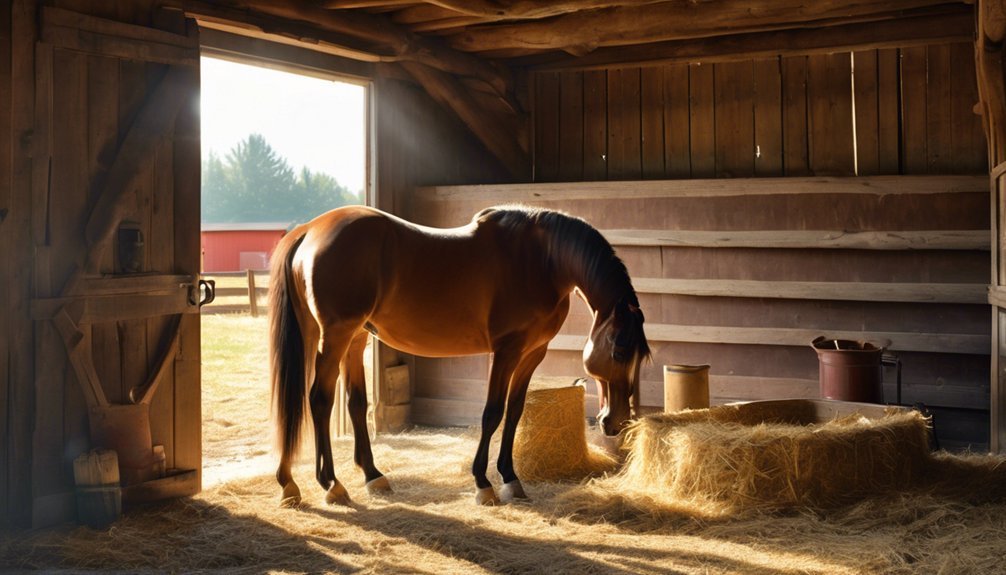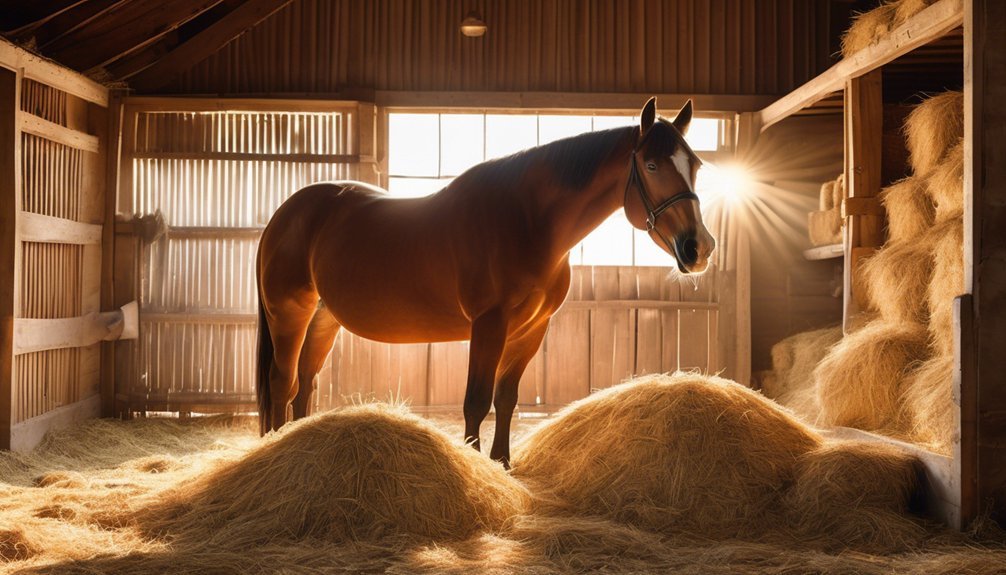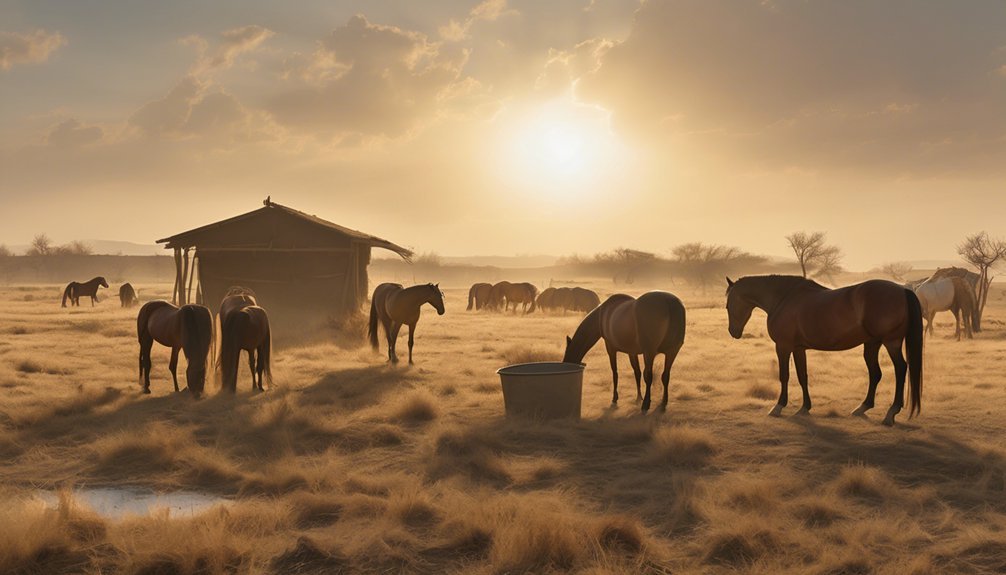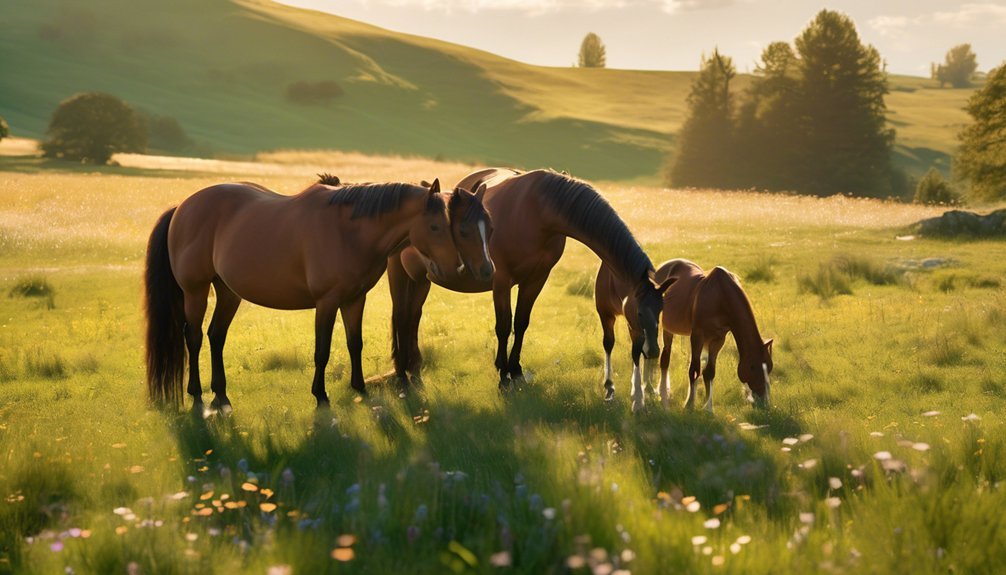
Feeding your horse isn't just about filling a bucket; it's a nuanced process that hinges on several factors, including nutritional needs and activity levels. Horses thrive on a consistent schedule, and understanding how often to feed can significantly impact their health and performance. As you consider your horse's individual requirements, you'll find that the right feeding routine can make all the difference. So, what should you keep in mind when developing this routine?
Key Takeaways
- Horses should have free-choice hay available throughout the day to meet their fiber needs and maintain digestive health.
- Grain feeding is typically recommended 2-3 times daily, adjusted based on the horse's activity level and energy requirements.
- Anxious or active horses may benefit from more frequent feedings to provide security and sustained energy throughout the day.
- Monitor seasonal changes, as increased caloric needs may necessitate adjustments in feeding frequency and quantities.
- Regularly assess your horse's body condition to make necessary adjustments to feeding routines and ensure optimal health.
Understanding Your Horse's Nutritional Needs

Understanding your horse's nutritional needs is crucial for maintaining its overall health and performance. Start by assessing the hay types you offer, as they significantly impact your horse's diet.
Grass hays, like timothy, provide fiber and essential nutrients, while legume hays, such as alfalfa, are richer in protein and calories. Striking the right nutrient balance is key; too much or too little of specific nutrients can lead to health issues.
Monitor your horse's body condition and adjust the hay types accordingly. Incorporate minerals and vitamins as needed, ensuring your horse receives a well-rounded diet.
Factors Influencing Feeding Frequency
The nutritional balance you've established for your horse directly influences how often you should feed it. A consistent feeding schedule supports digestive health, especially if your horse thrives in a calm feeding environment.
If your horse has a more anxious temperament, you might need to feed it more frequently to alleviate stress and promote a sense of security. Additionally, consider the type of work your horse does; active horses may require more frequent feedings to maintain energy levels.
Seasonal changes can also affect feeding frequency, as colder weather often increases caloric needs. Ultimately, understanding your horse's individual needs, including its temperament and environment, allows you to fine-tune its feeding schedule for optimal health and well-being.
Types of Feed and Their Role

While selecting the right type of feed for your horse, it's crucial to recognize that different feeds serve distinct purposes and nutritional needs. Understanding the various options will help you provide optimal care.
- Grain Types: These are energy-dense and often include oats or corn, beneficial for performance horses.
- Forage Varieties: Hay and pasture are essential for digestive health, providing fiber and promoting gut function.
- Pelleted Feeds: These combine grains and forages, ensuring a balanced diet in a convenient form.
- Supplements: These can address specific deficiencies, supporting overall health and performance.
General Feeding Guidelines
Establishing a consistent feeding routine is essential for maintaining your horse's health and performance. You should focus on the quality of hay and the feeding methods you use to ensure optimal nutrition. Here's a quick guide to help you:
| Feeding Method | Recommended Timing | Considerations |
|---|---|---|
| Free-Choice Hay | Throughout the day | Ensure hay quality is high |
| Grain Feeding | 2-3 times daily | Adjust based on activity |
| Supplements | As needed, daily | Consult a vet for specifics |
| Water Access | Constantly available | Fresh and clean |
| Pasture Grazing | Daily, as available | Monitor pasture quality |
Feeding Schedule for Different Ages

Feeding schedules vary significantly based on a horse's age, as their nutritional needs change throughout their life stages. Understanding these differences helps ensure your horse thrives.
- Foal Feeding: Young horses need frequent, small meals to support rapid growth.
- Yearlings: Transition to three meals a day, focusing on quality forage and concentrates.
- Adult Horses: Maintain a balanced diet with two meals daily, considering activity levels.
- Senior Nutrition: Older horses may require soft, easily digestible feeds and more frequent meals to maintain weight.
Adjusting Feed for Activity Levels
As your horse's activity level changes, so should their diet to meet their evolving energy needs.
During periods of increased exertion, such as during training or competitions, you'll need to make activity level adjustments in their feed. This often means increasing the caloric intake through higher-quality forage or additional concentrates.
Conversely, if their activity decreases, you may need to reduce their feed to prevent weight gain.
Seasonal feed changes also play a crucial role; for instance, during colder months, your horse might require more energy to maintain body heat.
Always monitor their weight and adjust their diet accordingly, ensuring they receive the right balance of nutrients to support their health and performance throughout the year.
Special Considerations for Health Issues

When managing a horse with specific health issues, it's crucial to tailor their diet to address those needs effectively. This might involve adhering to dietary restrictions related to their medical conditions, ensuring they receive the right nutrients without exacerbating their issues.
Prioritizing digestive health is key; certain conditions may require easily digestible feeds or specialized feeding supplements.
- Monitor weight and adjust feed accordingly.
- Consult your veterinarian for specific dietary recommendations.
- Incorporate high-fiber options to aid digestion.
- Use feeding supplements wisely to enhance nutrient absorption.
Signs of Overfeeding or Underfeeding
Recognizing the signs of overfeeding or underfeeding is vital for maintaining your horse's health.
Overfeeding symptoms often include excessive weight gain, a bloated abdomen, and an increased risk of laminitis. You might also notice your horse becoming lethargic or exhibiting behavioral changes due to discomfort.
On the other hand, underfeeding indicators can be just as concerning. If your horse appears ribby, has a dull coat, or shows signs of fatigue, it's time to reassess their feed.
Behavioral signs, such as irritability or decreased performance, may also emerge.
Tips for Transitioning to a New Feeding Routine

Transitioning to a new feeding routine can be a crucial step in optimizing your horse's health and performance.
To ensure a smooth transition, consider the following tips:
- Make gradual changes: Adjust your horse's diet slowly over 7-10 days to prevent digestive upset.
- Monitor behavior: Keep an eye on your horse's demeanor and appetite during the transition.
- Assess body condition: Regularly evaluate your horse's weight and overall health to ensure the new routine is effective.
- Consult a veterinarian: Seek professional advice if you're unsure about dietary changes or your horse's specific needs.
Frequently Asked Questions
Can Horses Eat Treats Between Meals?
Yes, horses can enjoy treats between meals, but it's crucial to choose appropriate treat types and maintain treat moderation. Overindulging can lead to digestive issues, so keep their health and happiness in mind.
How Do I Store Horse Feed Properly?
To store horse feed properly, use airtight containers to prevent moisture and pests. Keep the feed in a cool, dry place, and label containers with the date to ensure freshness and maintain nutritional value for your horse.
What Time of Day Is Best for Feeding?
Research shows horses thrive on consistency; feeding them at the same time daily supports their digestive health. Establishing a morning routine and maintaining an evening schedule helps you bond with your horse while ensuring their well-being.
Can I Feed My Horse Hay Only?
You can feed your horse hay only, but ensure it meets nutritional needs. Monitor feeding frequency to prevent digestive issues, and supplement with grains or minerals if hay's nutrition isn't sufficient for your horse's health.
How Can I Tell if My Horse Is Hungry?
To tell if your horse's hungry, watch for hunger signs like increased agitation, pawing, or vocalizations. Observe their feeding behavior; a restless horse often indicates it's time to provide more hay or grain.
Conclusion
In conclusion, establishing an effective feeding routine for your horse is crucial for their health and performance. By understanding their nutritional needs, adjusting feed based on activity levels, and monitoring their weight, you can ensure they thrive. Coincidentally, as you refine their diet, you'll likely notice improvements in their energy and temperament. So, embrace the journey of tailoring their feeding schedule—your horse will thank you with every gallop and neigh!





